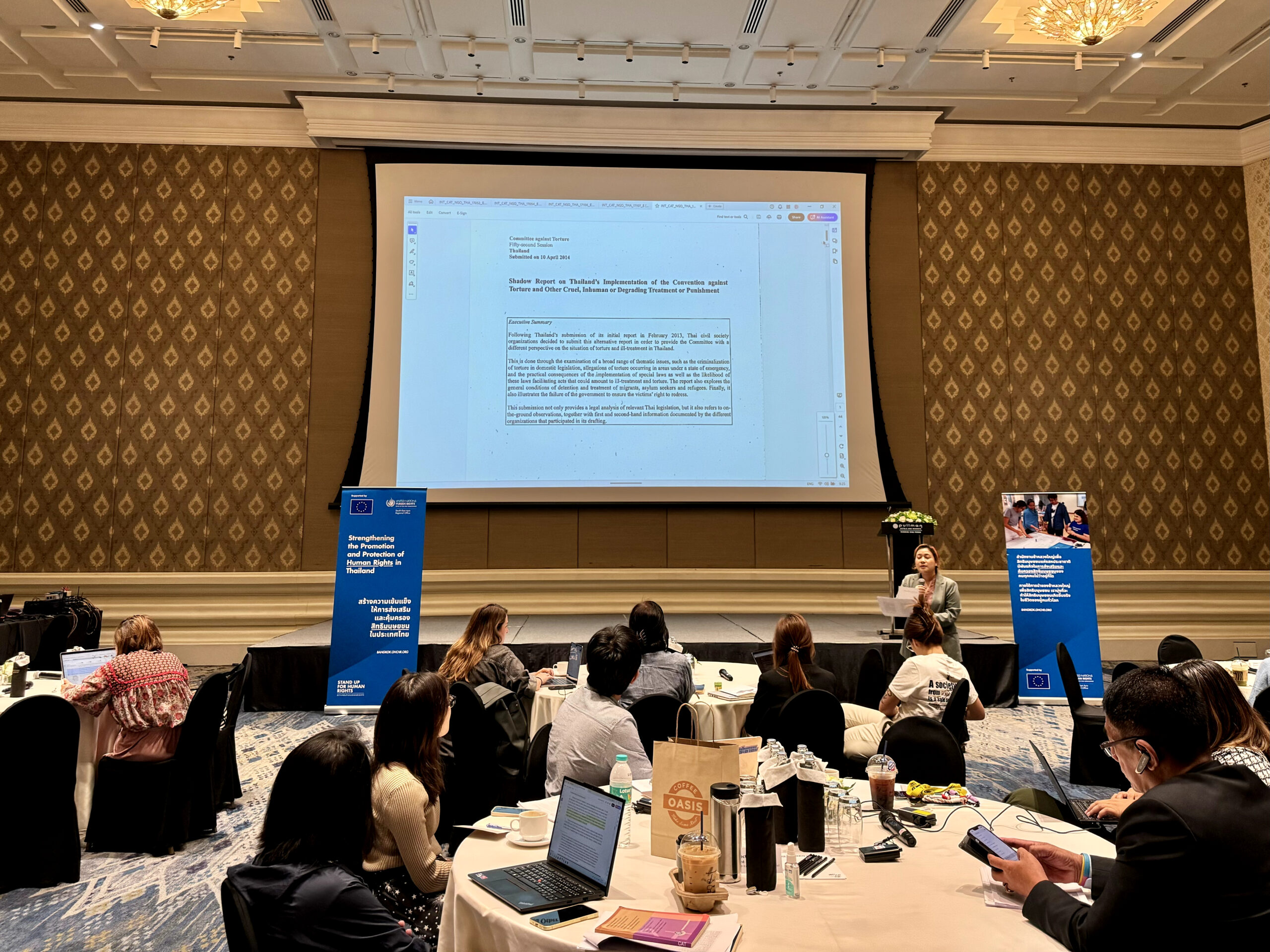On 13-14 July and 6-7 August 2024, human rights defenders and civil society organizations from various regions of Thailand gathered to discuss shortcomings in the country’s compliance with its obligations under the UN Convention against Torture.
Participants attended workshops co-hosted by the International Commission of Jurists (ICJ), Cross-Cultural Foundation, Office of the United Nations High Commissioner for Human Rights (OHCHR) and World Organization Against Torture (OMCT), in Bangkok and Chiang Mai province, to hear common concerns and consider strategic advocacy for civil society engagement with the UN human rights treaty bodies, particularly the UN Committee against Torture (CAT).
The workshops focused on the upcoming examination by the CAT of Thailand’s Second Periodic Report on the performance of its obligations under the Convention against Torture and Other Cruel, Inhuman or Degrading Treatment or Punishment (UNCAT), due to be undertaken during its 81st session from 28 October to 22 November 2024. In addition to receiving the State report of Thailand, the CAT may consider stakeholder submissions and the workshops discussed critical issues that might be incorporated into these submissions.
Participants included some 60 human rights defenders and members of civil society organizations specializing in monitoring and documenting allegations of torture and other ill-treatment, and enforced disappearance in various contexts including migration, gender-based violence, trafficking, extra-custodial use of force, children, drug users, indigenous persons, prison management, and other healthcare settings.
Upon consideration of the initial report of Thailand in 2014, the CAT identified a number of compliance concerns, including in relation to allegations of widespread use of torture and ill-treatment; special laws providing for enlarged executive powers of administrative detention without judicial oversight; the climate of de facto impunity for acts of torture and enforced disappearance committed in Thailand; inadequate action to combat gender-based violence and trafficking; poor conditions of detention, and non-compliance with the principle of non-refoulement.
Some of the CAT’s recommendations were implemented. For instance, in response to concerns about the absence of a definition of torture and its lack of recognition as an offence, Thailand recently adopted the Act on Prevention and Suppression of Torture and Enforced Disappearance, which came into force in February 2023.
Nevertheless, during the workshop, participants expressed the view that many of these deficiencies were ongoing, and others had not been addressed previously by the Committee in their concluding observations. It was agreed that the following issues would be raised in stakeholder submissions to the Committee:
- Remaining obstacles in law and in practice to the effective prosecution of perpetrators of domestic violence and other sexual and gender-based violence;
- The inappropriate criminalization of drug users and the use of special laws allowing for the incommunicado detention of suspects without adequate judicial oversight, which has created an environment prone to torture and ill-treatment;
- Allegations of enforced disappearance against indigenous persons and drug user suspects committed by State agents, whose fate or whereabouts remains unknown and for whom justice has yet to be served;
- Poor conditions of immigration detention centers and the rising number of persons at risk of refoulement and extradition in violation of the UNCAT;
- Allegations of torture and ill-treatment of children deprived of liberty or those who are victims of various forms of gender-based violence and trafficking; and
- Extra-custodial unlawful use of force in the context of protests by state agents amounting to torture or other cruel, inhuman, or degrading treatment or punishment.
Background
The workshop is part of a series of consultations co-hosted by the ICJ across Thailand to assist CSOs in identifying strategic priorities for the upcoming examination by the CAT, 10 years since the last one. These workshops followed a similar one held with civil society in Thailand’s southern border provinces in June 2024.
Thailand ratified the UNCAT in 2007.
Following the examination of Thailand’s initial report, the Committee against Torture adopted its Concluding Observations in June 2014, which highlighted areas in which Thailand was non-compliant with the UNCAT provisions.
In preparation for Thailand’s Second Periodic Report under the UNCAT, the Committee issued the List of Issues Prior to Reporting (LoIPR) in June 2018, seeking clarifications on various issues, including progress on the 2014 recommendations. Thailand submitted its formal response in December 2021, which constitutes its Second Periodic Report.
Contact
Sanhawan Srisod, Associate International Legal Adviser, Asia and Pacific Programme, e: sanhawan.srisod@icj.org





